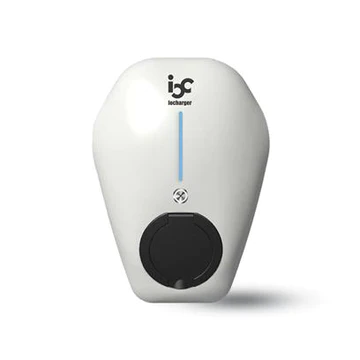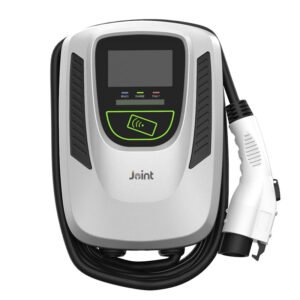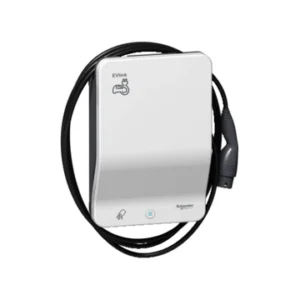7K-11KW SMART MINI (NON TR25) – NOT for sale in Singapore
$1,188.00
7K-11KW OCPP 1.6J WIFI & BLUETOOTH MINI SMART EV CHARGER
IOCAH15 is a perfect choice for home charging with compact design yet powerful and smart. Multiple functions are available on IOC Lite App to manage charging schedules, load balancing and energy sources from solar & battery.
- Input Rating:1-phase 230V±20% ; 3-phase 400V±20%
- Output Rating:1-phase 7kW 32A ; 3-phase 11kW 16A
- Internal RCD:AC 30mA & DC 6mA IEC62955 & IEC61008 certified
- Network Interface:Ethernet/ WiFi/ Bluetooth smart internet connection
- OCPP:Full OCPP 1.6J/ OCPP 2.0.1 support
- Ingress Protection:IP55
- Shipping Dimensions:398 x 285 x 176 mm; 398 x 285 x 226 mm
- Charging Interface:SAE J1772 & Type-2 cable/ Type-2 socket
- Mounting Type:Wall or Floor( pedestal supplied separately)
Share:
Genral FAQ's
How long does it take to charge an Electric Vehicle (EV)?
AC Charging Station: 4 to 8 hours
DC Fast Charger: 30 mins to 1 hour
How much does it cost to charge an EV in Singapore?
The average cost of charging is approximately 50 Singapore Cents per kWh.
Assuming the Electric Vehicle has a 50 kWh battery capacity.
Charging your EV from 10% to 100%, it would amount to a total of 45kWh x $0.50 = $22.50.
How do I know if the charger is compatible with my EV?
There are two types of common charging connectors, Type 1 & Type 2.
Type 2 connector is commonly used in AC charging whereas the CCS2 connector is commonly used for DC charging.
*** Note: Some older Japanese EVs such such as Nissan Leaf utilize the CHAdeMO connector.
Are outdoor EV chargers safe to use during rain and in lightning and adverse weather conditions?
The short answer is ‘Yes”. However, for your own safety, do not operate, commence or disconnect charging terminals during adverse weather conditions.
Charger FAQ's
Power ratings VS EV charging time.
AC charging is limited to EV’s onboard charger to convert AC to DC. Therefore if the onboard AC Charger is only rated at 7kW, even if you use an 11kW AC charger, the battery can only be charged at 7kW.
On the other hand, DC Chargers have the capability of converting the AC to DC current and therefore they are able to deliver a higher current and results in faster charging times.
How do I ascertain if there is sufficient electrical supply in my landed home to charge my EV?
Contact SuperCharge.SG and we will send a team and a Licensed Electrical Worker for a free non-obligatory site inspection.
When will the Smart Charger stop charging?
EVs are designed to automatically stop and/or trickle charge when the batteries reach near full charge to prevent overcharging and prolong battery life.
How to Change my Subscription Plan using PayPal
How many EV chargers can we install?
The EV Common Charger Grant (ECCG) co-funds the installation of smart chargers for up to 1% of residential carpark lots (including visitors and handicapped lots & excludes loading bay); rounded-up to the nearest whole number.
For example, if there are 70 parking lots in an Non-Landed Private Residence (NLPR, ie condo), 1% of 70 = 0.7, rounded-up to the nearest whole number equals to 1. 1 charger is be eligible for co-funding.
Can we still apply for the grant if we have an existing EV charger?
Yes. However, LTA prioritizes applications of NLPRs without existing EV chargers.
Are EV chargers installed prior to 19 Jul 2021 eligible for the ECCG?
No.
Are mixed-use Private developments eligible for the ECCG?
Yes provided the following criteria are met:
● EV Chargers benefit more than 1 household;
● EV Chargers are for residence’s exclusive use; and
● EV chargers are installed in a location owned and part of the development (e.g. not on state land).
What are the items not eligible for ECCG claims?
Items not directly needed for the installation or operations of a charger are not eligible for the ECCG claims.
These include (but not limited to):
- Signages
- Repainting of parking lots
- Electrical infrastructure upgrades
- Civil infrastructure
- Grid connection fees charged by SP Power
How do we apply for the ECCG?
Applications for ECCG is done via the Business Grants Portal (BGP). SuperCharge.SG will assist you every step of the ECCG application.
More information on EV Common Charger Grant (ECCG) is found on LTA’s Website.
Host an EV Charging Station
Related products
-
AC Chargers
AC EV CHARGER (NON TR25) – NOT for sale in Singapore
Rated 0 out of 5$1,288.00 Add to cart -
AC Chargers
PEDESTAL DUAL AC EVSE (NON TR25) – NOT for sale in Singapore
Rated 0 out of 5$4,888.00 Add to cart -
AC Chargers
TELTONIKA TELTOCHARGE (NON TR25) – NOT for sale in Singapore
Rated 0 out of 5$1,788.00 Add to cart






